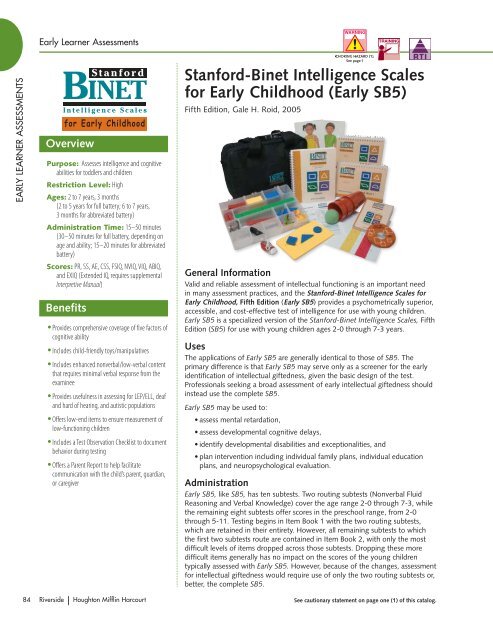Ordering information - Riverside Publishing
Ordering information - Riverside Publishing
Ordering information - Riverside Publishing
Create successful ePaper yourself
Turn your PDF publications into a flip-book with our unique Google optimized e-Paper software.
EArLy LEArnEr AssEssmEnts<br />
84<br />
Early Learner Assessments<br />
Early SB5<br />
Overview<br />
Purpose: Assesses intelligence and cognitive<br />
abilities for toddlers and children<br />
Restriction Level: High<br />
Ages: 2 to 7 years, 3 months<br />
(2 to 5 years for full battery; 6 to 7 years,<br />
3 months for abbreviated battery)<br />
Administration Time: 15–50 minutes<br />
(30–50 minutes for full battery, depending on<br />
age and ability; 15–20 minutes for abbreviated<br />
battery)<br />
Scores: PR, SS, AE, CSS, FSIQ, NVIQ, VIQ, ABIQ,<br />
and EXIQ (Extended IQ, requires supplemental<br />
Interpretive Manual)<br />
Benefits<br />
• Provides comprehensive coverage of five factors of<br />
cognitive ability<br />
• Includes child-friendly toys/manipulatives<br />
• Includes enhanced nonverbal/low-verbal content<br />
that requires minimal verbal response from the<br />
examinee<br />
• Provides usefulness in assessing for LEP/ELL, deaf<br />
and hard of hearing, and autistic populations<br />
• Offers low-end items to ensure measurement of<br />
low-functioning children<br />
• Includes a Test Observation Checklist to document<br />
behavior during testing<br />
• Offers a Parent Report to help facilitate<br />
communication with the child’s parent, guardian,<br />
or caregiver<br />
riverside | Houghton mifflin Harcourt<br />
Stanford-Binet Intelligence Scales<br />
for Early Childhood (Early SB5)<br />
Fifth Edition, Gale H. Roid, 2005<br />
General Information<br />
Valid and reliable assessment of intellectual functioning is an important need<br />
in many assessment practices, and the Stanford-Binet Intelligence Scales for<br />
Early Childhood, Fifth Edition (Early SB5) provides a psychometrically superior,<br />
accessible, and cost-effective test of intelligence for use with young children.<br />
Early SB5 is a specialized version of the Stanford-Binet Intelligence Scales, Fifth<br />
Edition (SB5) for use with young children ages 2-0 through 7-3 years.<br />
Uses<br />
The applications of Early SB5 are generally identical to those of SB5. The<br />
primary difference is that Early SB5 may serve only as a screener for the early<br />
identification of intellectual giftedness, given the basic design of the test.<br />
Professionals seeking a broad assessment of early intellectual giftedness should<br />
instead use the complete SB5.<br />
Early SB5 may be used to:<br />
• assess mental retardation,<br />
• assess developmental cognitive delays,<br />
• identify developmental disabilities and exceptionalities, and<br />
• plan intervention including individual family plans, individual education<br />
plans, and neuropsychological evaluation.<br />
Administration<br />
Early SB5, like SB5, has ten subtests. Two routing subtests (Nonverbal Fluid<br />
Reasoning and Verbal Knowledge) cover the age range 2-0 through 7-3, while<br />
the remaining eight subtests offer scores in the preschool range, from 2-0<br />
through 5-11. Testing begins in Item Book 1 with the two routing subtests,<br />
which are retained in their entirety. However, all remaining subtests to which<br />
the first two subtests route are contained in Item Book 2, with only the most<br />
difficult levels of items dropped across those subtests. Dropping these more<br />
difficult items generally has no impact on the scores of the young children<br />
typically assessed with Early SB5. However, because of the changes, assessment<br />
for intellectual giftedness would require use of only the two routing subtests or,<br />
better, the complete SB5.<br />
See cautionary statement on page one (1) of this catalog.


